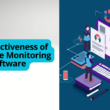technology that has proven to be a game-changer is RFID (Radio Frequency Identification). By integrating advanced RFID systems, businesses can significantly reduce operational costs, enhance inventory accuracy, and streamline operations.
What is RFID Asset Tracking?
RFID-based asset tracking is a system in which radio frequency identification techniques are employed to identify and track the assets concerned. Every asset has an RFID label that contains readable information, including an identifiable asset number that an RFID reader can read. This then allows tracking its location, status, and journey history to provide businesses with real-time control and visibility of the asset.
Why is RFID Asset Tracking Important?
Regardless of the size or industry, RFID asset tracking offers several key benefits that can significantly impact a business’s efficiency and profitability.
1. Enhances Data Accuracy and Saves Time and Money
Near real-time data reporting is another benefit of using RFID asset tracking since it does not require constant monitoring by a human being. Traditional methods of tracking assets often involve entering data manually or using a bar-code scanner; on the other hand, RFID ensures the asset register is updated in real time as the assets are used or transferred to another location. It eliminates or minimizes the possibilities of human errors and provides many human resources that can be deployed in other functional areas of the organization.
2. Boosts Revenue Through Optimized Asset Management
RFID asset tracking guarantees that the fixed assets are well maintained to peak working condition through timely maintenance alerts. The time taken to conduct repairs and replacements makes it possible to cut forces incurred on the same since assets will spend more time working than being repaired or replaced.
3. Increases Asset Visibility and Reduces Losses
There is no better way for a business to get insight into its fixed assets than through RFID technology. An assets register helps businesses easily identify misplaced items, reducing theft cases and avoiding unnecessary procurement of similar assets. This visibility is further boosted in the cloud-based asset management systems that provide an entire dashboard that displays the general condition of assets and the lifecycle details that can be accessed organization-wide.
4. Enhances Asset Security
This technology enhances the security of assets by tracking them within the context of a business facility. It can monitor all types of movement from a specific area and document them in case of any irregular activity, thus preventing theft or trespassing. This improved security is particularly useful where the firm’s assets are valuable or are vulnerable to theft.
5. Improves Customer Service
Implementing RFID will also improve customer service by ensuring that the products are always in the shop and ordered in the right place. For instance, a retail store can apply RFID to monitor inventories and re-order products when they are almost out of stock so that customers do not go away unsatisfied. It results in better customer satisfaction and retention, which provide considerable competitive advantage.
6. Facilitates Informed Decision-Making
RFID appliances in asset tracking help provide business owners with real-time data to make the right decisions every single day. With better and current information on the status of the assets, business operations could improve the use of its resources, control the lead times, and thus improve the business’s efficiency. Such a methodology enables the company to better adapt to the changing market environment and evolving client needs.
RFID asset tracking has emerged as one of the most prominent applications for organizations that need higher operations optimization, decreased expenditures, and increased customer satisfaction. RFID technology provides real-time information with corresponding control over assets, improving business efficiency and decision-making.
It is more apparent that every advancing technology will assume a more critical function in managing the business organization. IT departments of companies interested in remaining relevant and competitive today can forget about RFID asset tracking as a possibility – it has become a necessity.








